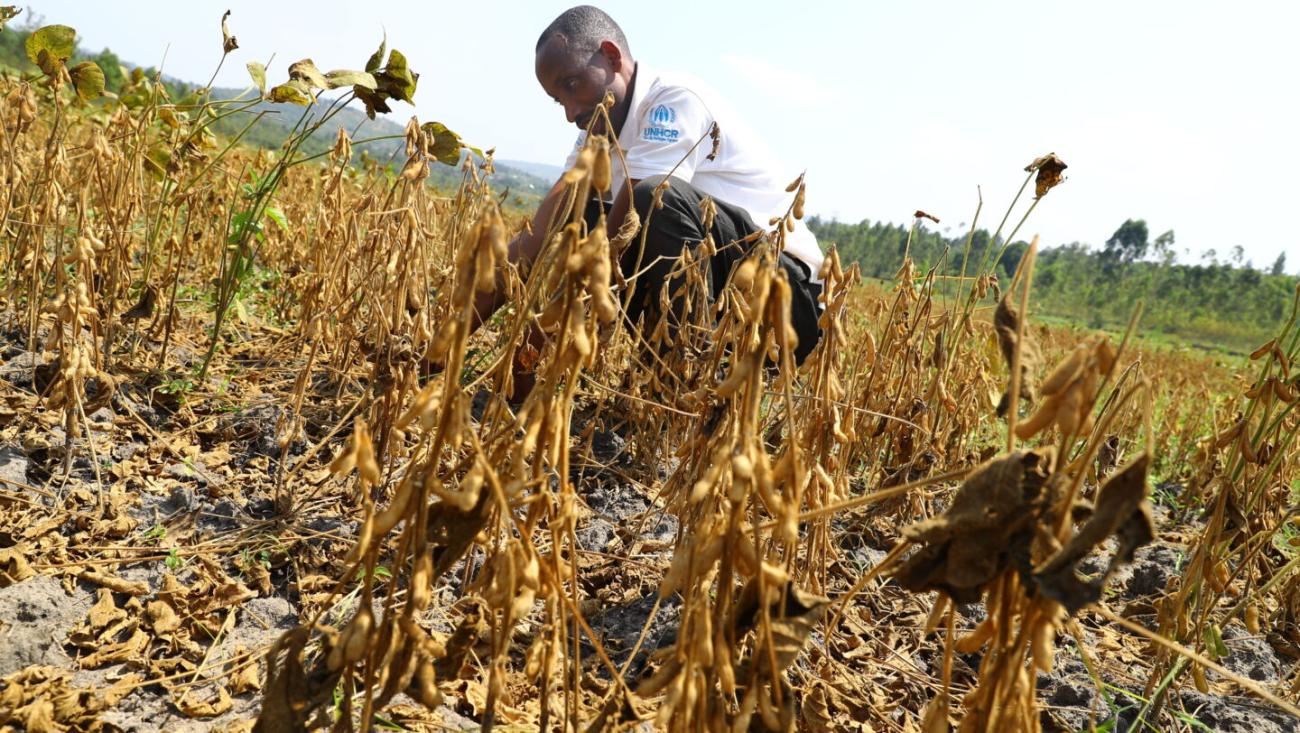Supporting refugee livelihoods in Rwanda

.
Forced to flee from his native Democratic Republic of Congo (DRC) due to war, Shema Kayitare, had to leave everything behind and seek refuge in Rwanda. Living in Nyabiheke refugee camp located in the eastern part of the country since 2013, it was not easy for the 35-year-old man to adjust to a new life in the camp.
But with different initiatives meant to support refugees' livelihoods in Nyabiheke, Shema can now rebuild his life.
“We were living an isolated life in the camp. But we are now grateful to the Government and UNHCR for providing us with farming plots in Nyabicwamba marshland where we grow maize and soybeans,” Shema explains.
He adds that in the marshland, they learned some good practices from their Rwandan hosts and vice versa.
“This doesn’t only improve our friendship, but we also get yields from the marshland for home consumption, and we sell another portion of it to market to get some income,” Shema points out.
He made the remarks during a recent X space that was organized in the lead-up to the UN Day celebration held on 20th October 2023. The online-based conversation focused on initiatives to support refugee livelihoods in Rwanda, and featured some refugees who have been supported through different initiatives by the UNHCR.
During his presentation, Shema shared the story of their cooperative dubbed "Koperative Duhuzimbaraga Gatsibo (CODIGA)," a thriving community of farmers from refugee and Rwandan host communities.
“Last season, I harvested 111 kg of soybeans. I took home 5kg to make porridge for my family and sold the rest of the produce, earning Rwf 80,000 (approx.US$60). I shared the money with my wife so that she could buy other basic needs of the family,” Shema says, adding that he knows colleagues who earned more than him.
Shema is part of the 466 Congolese refugees in Nyabiheke camp from neighboring areas who are supported to improve their livelihood through this farming project.
Danya Kattan, UNHCR livelihoods officer, explained that the idea was to bring together refugees and Rwandans living in neighboring areas so they can work together and coexist. It is in line with a joint strategy for graduation and self-reliance by the Ministry in Charge of Emergency Management (MINEMA) and UNHCR.
Currently, UNHCR has over 135,000 refugees and asylum seekers registered in Rwanda. Most of these refugees come from DRC and Burundi – around 60% are Congolese while about 40% are Burundians.
90% of these refugees live in five camps across the country.
Around 80% of the refugee population in Rwanda is ranked as highly vulnerable and fully relies on humanitarian assistance – the reason why UNHCR is working with different partners and the host Government to support them to become self-reliant by taking advantage of available opportunities such as through agriculture.
Despite the conducive legal environment in place, there are still challenges that prevent refugees from accessing economic opportunities across the country, Danya observes.
“There is a lack of information among different actors, especially the private sector about refugees -- about refugees’ right to work. We’re working on overcoming these challenges,” she says.
Alternative Dispute Resolution and Criminal Justice policies serve as alternatives to litigation.
On 10th January 2023, the Ministry of Justice and Development Partners launched the Alternative Dispute Resolution (ADR) and Criminal Justice policies. The event, presided over by Minister for Justice and Attorney General Dr. Emmanuel Ugirashebuja, marked a significant step in the Justice, Reconciliation, Law and Order Sector, Justice Service delivery, and promotion of the Rule of Law, with full participation of the citizens.
The development of this policy is one of the targets of Rwanda’s justice sector reforms since 2012, to ensure that people effectively resolve their disputes with mutual understanding and satisfaction, enhance amicable dispute resolution mechanisms, encourage the culture of problem-solving in families, and strengthen cordial settlement of disputes in Rwandan society.
The United Nations Development Programme (UNDP) is taking the lead in promoting ADR mechanisms in partnership with the Ministry of Justice. Jean de Dieu Kayiranga, Programme Analyst at UNDP Rwanda, highlights the dual nature of the necessity for the organization to intervene and support the Ministry of Justice in developing and implementing the ADR policy.
He stated that there was an urgency for people to access justice promptly, and the challenges of prolonged case processing and backlog have to be addressed. He believes that at the moment, mediation is the best approach and a sure way to reduce the case backlog.
Traditionally, Rwandans took a problem-solving approach to justice anchored on community participation in various dispute resolution forums. The work done by Gacaca courts after the 1994 Genocide against the Tutsi is a testimony to how Rwandans can solve millions of cases quickly while also building relationships and consolidating cohesion among Rwandans.
According to Rwanda Governance Board Chief Executive Officer Dr. Usta Kaitesi, more than 12,000 community-based courts tried more than 1.2 million cases throughout the country. The Gacaca trials also served to promote reconciliation by providing a means for victims to learn the truth about the death of their family members and relatives.
Apart from the Ministry of Justice, UNDP Rwanda has involved other stakeholders like Government institutions, Development Partners, Private and Civil Society Organizations, that will help push for the embracing of the policies.
While mediation is used for settling civil, commercial, labor, and administrative cases, arbitration is used to settle commercial disputes among parties with the help of arbitrators. UNDP is supporting Rwanda’s ADR policy to enhance access to justice for all citizens, especially those vulnerable citizens who cannot afford expensive court fees.
According to Anastase Nabahire, the Director General in Charge of Justice Sector Coordination at the Ministry of Justice, 'Instead of prolonged litigation, people should save time, money, and relationships by resolving conflicts through easier methods,' he said.
Nabahire commends the support of the UNDP and other development partners in developing strategic plans for policies related to dispute resolution. He discussed the ongoing refurbishment of a facility to serve as an ADR coordination center, where mediation services and documentation would be provided.
He expressed optimism about the progress, especially with the implementation of strategic plans and the training of equipped mediators, saying in collaboration with the Judiciary, over 400 graduated in mediation. 'The Judiciary had already started providing mediation services before the adoption of the ADR dispute resolution policy. Legislators and judges were conducting mediations for eligible cases,' he added.
Written by





